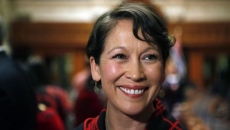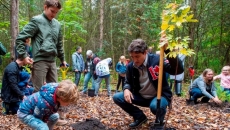NSD Canada is bringing back a requirement for everyone entering the country to have a pre-arrival negative molecular test result for COVID-19, even if travellers are returning after being away for under 72 hours.
Federal Health Minister Jean-Yves Duclos said the requirement is to return Tuesday, about a month since Canada waived the test for those taking short cross-border trips.
He said the pre-arrival tests must be taken outside of Canada, which is a new rule.
Canada is also removing a ban on all travellers who have recently passed through 10 African countries, a measure the federal government brought in late last month in response to the emergence of the Omicron variant first identified in South Africa.
Duclos said the measure has served its purpose and is to be lifted Sunday.
The changes came with a warning Friday to anyone still choosing to travel abroad as Omicron spreads.
"We do not want you to be stranded or to be sick abroad," Duclos told media.
"Once you have left the country, once you are stranded, once you are sick, there is little the Canadian government can do to help you."
Given the rapidly evolving situation with Omicron, Canadians should avoid non-essential international travel, & follow local public health guidance.
— Omar Alghabra (@OmarAlghabra) December 17, 2021
The government had been heavily criticized by border town mayors, the tourism industry and the Canadian Chamber of Commerce for the test requirement for short trips before it was temporarily removed.
Perrin Beatty, CEO of the chamber, questioned the requirement of a pre-arrival test when Omicron appears to be spreading within the community, not through international travel.
"The obvious question is, does restricting travel further make Canadians safer when a variant is already in the country and is increasing at an exponential rate?" he said.
"The pressure is there to be seen to be acting and responding to the crisis. Twice so far this week they've announced additional restrictions on travel, and the message they're sending to Canadians is, 'We're trying to deal with this problem.' "
Beatty said the emphasis should instead be placed on vaccination, including booster shots, in line with a move that scientists are calling for.
Public health experts said getting a test during a short trip over the border would be unlikely to identify new cases, even if someone contracted the virus abroad because the incubation period is longer than 72 hours.
Duclos defended its reinstatement and added it will be used in concert with other travel restrictions and warnings, such as post-arrival random tests for people who arrive from the United States.
"It's not a perfect measure, but it is an important one."
Chief public health officer Dr. Theresa Tam said Omicron may have a shorter incubation period before it shows up on a test, though that is still under investigation.
She said Omicron numbers have rapidly risen since last week in 11 provinces and territories. Increasing numbers of those cases are not linked to travel, indicating community spread, she said.
She urged Canadians to adjust their holiday plans.
Nova Scotia announced a record 394 cases Friday, prompting chief medical health officer Dr. Robert Strang to say the province's testing labs are being pushed to the limit.
He said testing and vaccinations are shifting to the most vulnerable.
"We are past the point of full control of this variant," he said. "We need to change how we manage and respond."
Many of those who test positive will have to manage their own cases without hands-on support from public health, he added.
"It's not ideal and I don't want Nova Scotians to think we're giving up and we're giving in to COVID. We haven't. We are changing our response to deal with Omicron."
Quebec reported 3,768 new COVID-19 cases, eclipsing its previous high set in January. Starting Monday, the province's retail stores, bars, restaurants and entertainment venues will be limited to 50 per cent capacity. Karaoke, dancing and holiday parties will also be forbidden.
Ontario Premier Doug Ford said new restrictions are set to take effect there Sunday. Indoor social gatherings will be capped at 10 people and capacity limits for restaurants, bars and retailers will be reintroduced over the holidays.
Food and drink consumption will also be prohibited at large venues, including theatres and sports arenas. Restaurant, bar and retail capacity limits will be set at 50 per cent, and outdoor social gatherings can have no more than 25 people, down from 100. Indoors, the limit for gatherings is down to 10 people from 25.
Join Adrian Dix, Minister of Health, and Dr. Bonnie Henry, BC's provincial health officer, for an update on COVID-19. https://t.co/uB8J6avFmU
— BC Government News (@BCGovNews) December 17, 2021
British Columbians will be living with new restrictions, too, starting Monday. They include limiting the capacity of large venues to 50 per cent, prohibiting no amateur sports tournaments over the holidays and the cancellation of New Year's Eve parties.
Daily new cases of COVID-19 have nearly doubled in the last week. To help keep people safe over the holidays, new provincial health officer orders are in effect as of December 20 until January 31. For more information: https://t.co/8Rz6gITRYu #CovidBC pic.twitter.com/ZyxfoOjFtf
— BC Government News (@BCGovNews) December 17, 2021
Provincial health officer Dr. Bonnie Henry said indoor gatherings, including those at rental or holiday properties, will be limited to one household plus 10 guests, and everyone must be vaccinated.
"We can still socialize with each other, but do it in a way that doesn't increase risk," Henry said.
Manitoba will bring in new restrictions on Tuesday that are similar to those in B.C.
Tam said vaccinated and unvaccinated people have tested positive for Omicron. But she stressed that being fully vaccinated and getting a booster of either is expected to provide reasonable protection against infection.






